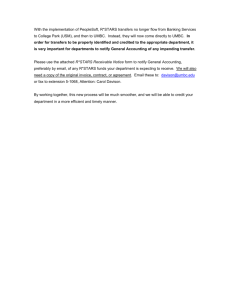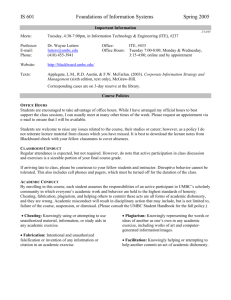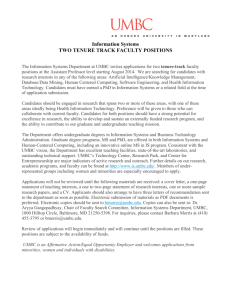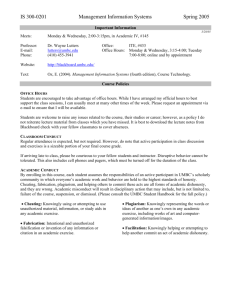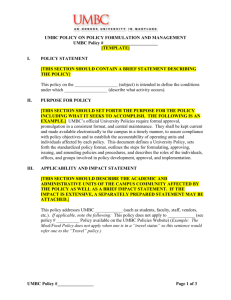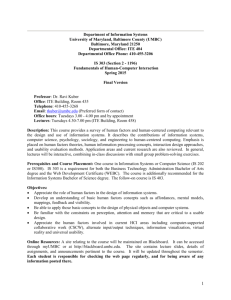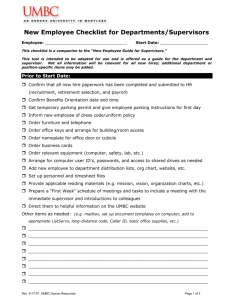Department of Information Systems University of Maryland
advertisement
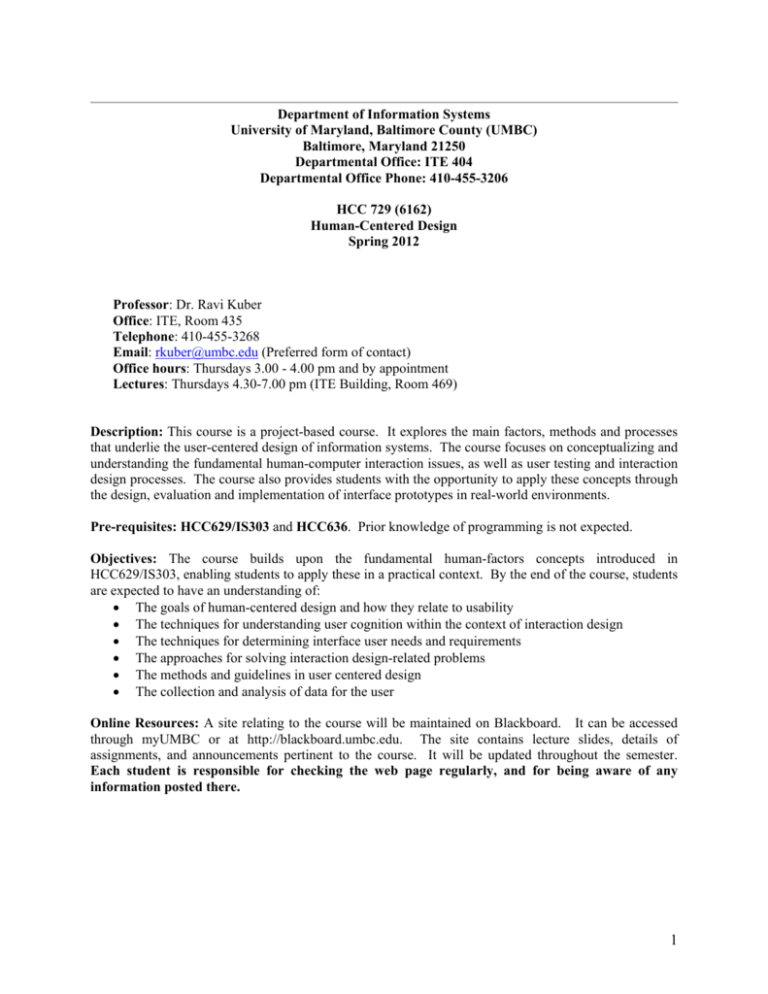
Department of Information Systems University of Maryland, Baltimore County (UMBC) Baltimore, Maryland 21250 Departmental Office: ITE 404 Departmental Office Phone: 410-455-3206 HCC 729 (6162) Human-Centered Design Spring 2012 Professor: Dr. Ravi Kuber Office: ITE, Room 435 Telephone: 410-455-3268 Email: rkuber@umbc.edu (Preferred form of contact) Office hours: Thursdays 3.00 - 4.00 pm and by appointment Lectures: Thursdays 4.30-7.00 pm (ITE Building, Room 469) Description: This course is a project-based course. It explores the main factors, methods and processes that underlie the user-centered design of information systems. The course focuses on conceptualizing and understanding the fundamental human-computer interaction issues, as well as user testing and interaction design processes. The course also provides students with the opportunity to apply these concepts through the design, evaluation and implementation of interface prototypes in real-world environments. Pre-requisites: HCC629/IS303 and HCC636. Prior knowledge of programming is not expected. Objectives: The course builds upon the fundamental human-factors concepts introduced in HCC629/IS303, enabling students to apply these in a practical context. By the end of the course, students are expected to have an understanding of: • The goals of human-centered design and how they relate to usability • The techniques for understanding user cognition within the context of interaction design • The techniques for determining interface user needs and requirements • The approaches for solving interaction design-related problems • The methods and guidelines in user centered design • The collection and analysis of data for the user Online Resources: A site relating to the course will be maintained on Blackboard. It can be accessed through myUMBC or at http://blackboard.umbc.edu. The site contains lecture slides, details of assignments, and announcements pertinent to the course. It will be updated throughout the semester. Each student is responsible for checking the web page regularly, and for being aware of any information posted there. 1 Reading Materials: This class requires students to read from a variety of books. Chapters which have been selected to supplement lectures are available in downloadable format from the UMBC library (http://aok.lib.umbc.edu/reserves/access.php). User names and passwords to access these materials will be assigned in class. These materials along with the lecture slides and assignments, must not be disseminated to anyone outside the course, or uploaded to any external web sites. The books themselves are on reserve, available from the Issue Desk at the UMBC library: • • • • • • Cairns, P.A. and Cox, A.L. (eds) (2008) Research Methods for Human-Computer Interaction. Cambridge University Press. ISBN: 9780521690317 Carroll, J.M. (2000) Making Use: Scenario Based Design of Human-Computer Interactions. MIT Press. Cook, A.M. and Polgar, J.M. 2008: Cook & Hussey's Assistive Technologies : Principles and Practice. 3rd Edition, Elsevier. Dix, A., Finlay, J., Abowd, G.A. and Beale, R. (2004) Human-Computer Interaction (3rd Edition). Prentice-Hall. ISBN: 0130461091 Sharp, Y., Rodgers, H. and Preece, J. (2007) Interaction design: Beyond human-computer interaction (2nd Edition). Wiley. ISBN: 0470018666 Sears, A. and Jacko, J. (eds) The Human-Computer Interaction Handbook (2nd Edition). Taylor and Francis. ISBN: 0805858709 Grading: The final grade will reflect the student’s achievement of the learning objectives. This will be measured through two individual assignments, two exams and class participation. The distribution of percentages among these components is given below: Assignment 1 (Individual) Assignment 2 (Group) Exam Participation 30% 35% 25% 10% Grading Standards: IS instructors are expected to have exams and evaluations which result in a reasonable distribution of grades. With respect to the final letter grades, the University’s Undergraduate Catalogue states that, “A indicates superior achievement; B, good performance; C, adequate performance; D, minimal performance; F, failure”. There is specifically no mention of any numerical scores associated with these letter grades. Final letter grades in this course conform to the University’s officially published definitions of the respective letter grades. In accordance with the published University grading policy, it is important to understand that final letter grades reflect academic achievement and not effort. While mistakes in the arithmetic computation of grades and grade recording errors will always be corrected, it is important to understand that in all other situations final letter grades are not negotiable and challenges to final letter grades are not entertained. Historical data suggests an “A” may be in the 91-100 range, a “B” may be from 81-89 and “C” grades range from 70-80. All points from assignments and exams are additive for the semester. Each student starts at zero points which is an “F”, any other grade must be earned. Note: From Fall 2010, instructors have the option of assigning grades including a plus or minus (e.g. B+) to graduate students enrolled in graduate classes. It is up to each individual instructor’s discretion as to whether this form of grading will be used during the semester. 2 Assignments: The assignments will result in a total of 65% of your semester grade. A maximum of 65 points can be awarded for Assignments 1 and 2. When submitting an assignment, be aware that numerous delays can occur. For example, computer failures, system performance issues, printing problems and other commitments. It is essential that students are able to organize their time effectively, to ensure that deliverables are handed-in on time. If an assignment is not in on time, it may possibly be accepted following the due date with an accompanying reduction of the 50% of the earned grade. If you do not hand-in an assignment, you will receive a zero grade. Writing Reports and Deliverables • Page limits have been specified for each assignment (excluding cover page, table of contents and references). These should be adhered to, as the instructor will not read further than the page limits specified. • Staple the report together, rather than using a folder. • On a cover page, clearly present your name or names of those in the group, email address and title of the assignment. • Use appropriate formatting (text size 10 point), 1.5 spacing, and always number pages. • Ensure that work is proof-read. • When citing or quoting existing work, always include appropriate references. No specific formatting of references is required. All students are required to research into an area of Human-Computer Interaction. A list of topics will be presented in the first class. Students are expected to use the UMBC library, digital libraries and various databases to obtain research papers from respected conferences and journals for the Assignment. All students working in groups are required to participate equally in project work. If one or more student(s) are not performing their fair share of work, their marks will be reflected accordingly. Exam: There will be one exam, which will result in a total of 25% of your semester grade. You may not use calculators, computers or other electronic devices for exams. You must bring picture ID. The exams will cover material from the lectures, readings and assignments. If you miss an exam, you will receive a zero grade. Participation: For most classes, class participation is listed as a factor that contributes to a students’ overall grade for a class. Performing assigned reading, attending class, and participating in classroom discussions, presentations and activities are considered normal and expected contributions to the class. To receive an above average grade a student must participate beyond this norm in a noteworthy way. This participation may occur in the classroom or outside of class. One example of this could be active participation in discussions on the class Blackboard site. Failure to contribute sufficiently in or outside class will result in a lower than average grade. Lateness to class may affect this grade. If you miss a class, you are responsible for getting the relevant notes and hand outs to help you prepare for the exams. This component will result in a total of 10% of your semester grade. Course Policies: • Assignments: Submissions are due in class on the specified dates. • Communication: Feel free to contact me by coming to my office (either during my office hours, or by making an appointment). You are also encouraged to send me email (rkuber@umbc.edu). Make sure you add “HCC729” in the subject of the email and you use your UMBC email account. Emails sent to me from non-UMBC providers (e.g. verizon.net, gmail.com, comcast.net, etc.) may be filtered out and never arrive in my mailbox. • Make-up Exams: There will be NO make-up exams unless an emergency occurs and an official 3 • • • • • document is submitted, verified, and pre-approved by the instructor. Notify the instructor immediately and before the class exam takes place. Important Note: Having multiple exams in the same day does not constitute a valid reason for a make-up exam. Re-grading: I will review any graded exam or assignment if you believe the grade you received was not appropriate. You have one week after the graded assignment is delivered to the class, to return it to me with a written statement discussing why you believe the item in question deserved a different grade. Please note that the entire assignment will be reviewed and your final assignment grade may be raised or lowered as a result of the review. Extra Credit: Simply stated, it does not exist, especially on an individual basis. Absence: In the case of absence due to emergency (e.g. illness), religious holiday, or participation in an official UMBC function, it is the student’s responsibility to confer with the instructor regarding the absence and missed work. Readings: Students are expected to read the materials that will be discussed in the class before the class meeting. Cell phones and beepers: All cell phones and beepers must either be turned off or set to a silent method of operation (e.g., vibrating rather than beeping). If you must answer a call, please leave the classroom. As with arriving late, if you disrupt the class you will be asked to leave the classroom. Academic integrity: By enrolling in this course, each student assumes the responsibilities of an active participant in UMBC's scholarly community in which everyone's academic work and behavior are held to the highest standards of honesty. Cheating, fabrication, plagiarism, and helping others to commit these acts are all forms of academic dishonesty, and they are wrong. Academic misconduct could result in disciplinary action that may include, but is not limited to, suspension or dismissal. To read the full Student Academic Conduct Policy, consult the UMBC Student Handbook, the Faculty Handbook, or the UMBC Policies section of the UMBC Directory. Acts of Academic Misconduct are defined as the following: • Cheating: Knowingly using or attempting to use unauthorized material, information, or study aids in any academic exercise. • Fabrication: Intentional and unauthorized falsification or invention of any information or citation in an academic exercise. • Facilitating Academic Dishonesty: Intentionally or knowingly helping or attempting to help another commit an act of academic dishonesty. • Plagiarism: Knowingly representing the words or ideas of another as one’s own in any academic exercise, including works of art and computer-generated information/images. Available Support Services: Utilize the resources that are provided to you by the University. Besides, you pay for them through your tuition, so why not to use them? • The UMBC Writing Center is a resource I highly recommend to all students who need some help in writing. • Blackboard. Various types of information will be posted on Blackboard, ranging from external links to a specific article relevant to the course, to internships available for IS students. Check the “Information” area in the course Blackboard site. • UMBC is committed to eliminating discriminatory obstacles that disadvantage students based on disability. Student Support Services (SSS) is the UMBC department designated to receive and maintain confidential files of disability-related documentation, certify eligibility for services, determine reasonable accommodations, develop with each student plans for the provision of such accommodations, and serve as a liaison between faculty members and students regarding disability-related issues. If you have a disability and want to request accommodations, contact SSS in the Math/Psych Bldg., room 213 or at 410-455-2459. SSS will require you to provide 4 appropriate documentation of disability. If you require accommodations for this class, make an appointment to meet with me to discuss your SSS-approved accommodations." Inclement Weather In case of inclement weather, check the main UMBC Webpage (http://www.umbc.edu) to see whether UMBC is closed and classes are cancelled. Any work due on a class date that has been cancelled due to inclement weather will be due the next class meeting. Using Lab Computers During lab times, it is essential that computers are used for activities relating to class activities, and not for personal or entertainment purposes. This includes using the computer for email, instant messaging, chatting, surfing the Web, and other activities which are not relevant during the class. Students who indulge in any of the above will be asked to leave the classroom for the reminder of the session and a record will be made of the incident. Class Evaluations Information Systems Department Class evaluations will be filled out online. You are strongly encouraged to fill out the evaluations online at the end of the semester and will be notified accordingly. 5 Tentative Schedule: Below is a tentative schedule of lecture topics and exams. I reserve the right to adjust this schedule for any reason, but I will make every effort to advise you of any changes well in advance. Please note that for some sessions, I may be unavailable due to a scheduling clash (marked with an asterisk *). Another instructor may take the class, or alternatively students will be expected to perform the work set for the session independently. The work will be then discussed either on the Blackboard messageboard or in the next class. Lecture 1 2 Date 1/26 2/2 3 2/9 4 2/16 5 2/23 Topic Introduction to Syllabus Data Gathering Contextual Design & Ethnography Usability Lab Tour Guest Lecture: Information Architecture (Celeste Paul) Scenario Based Design Data Gathering through Eye-tracking Web-based design Prototyping using Visual Basic 6 3/1 Evaluation Techniques 7 3/8 * 8 3/15 3/22 3/29 9 4/5 10 4/12 11 4/19 12 13 14 4/26 5/3 5/10 15 5/17 Review Class Group work (Assignment 2) Exam Spring Break – No Class Formulating a Usability Study Experiment Design Evaluation Techniques Continued Basic Quantitative and Qualitative Analysis Guest Lecture: Quantitative Analysis Lab (Dr. Ozok) Participatory Design Design & Testing with Diverse Populations Group work (Assignment 2) HCI for Desktop and Mobile Games Group work (Assignment 2) Guest Lecture TBD Final Presentations for Assignment 2 Interfaces for Rehabilitation Future Directions in HCC No class Reading Dix et al. – Chapter 5 Cairns and Cox – Chapter 2 Sears and Jacko – Chapter 49 Assignments Assignment 1 set Carroll – Chapter 3 Cairns and Cox – Chapter 3 Assignment 2 set Preece et al. Chapter 11 Visual Basic handouts provided in advance Dix et al. - Chapter 9 Discussion of your progress on Assignment 1 in class Discussion of your progress on Assignment 1 in class Assignment 1 collected Sears and Jacko – Chapters 57 and 58 Cairns and Cox – Chapters 1, 6 and 7 One page synopsis of progress on Assignment 2 Sears and Jacko – Chapter 44 and 54 Rollings and Morris – Chapter 3 Discussion of your progress on Assignment 2 in class Readings on Blackboard site Assignment 2 collected Cook and Polgar – Chapter 1 Readings on Blackboard site for discussion 6
